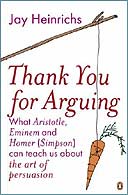Thank You For Arguing
by Jay Heinrichs
Allen Lane/Penguin £14.99, pp336
Zeno: 'Rhetoric is an open palm, dialectic a closed fist.'
Carl: 'Let's make litter of the literati.'
Lenny: 'That's too clever! You're one of them!' (punches him) - The Simpsons
This entertaining volume is a romp through the rules of rhetoric, a primer in the art of argument. Colourful and instructive, it is broad in its sources. Subtitled 'What Aristotle, Eminem and Homer (Simpson) Can Teach Us About the Art of Persuasion', American author and wit Jay Heinrichs isn't exaggerating. Almost everyone you can think of appears in this deconstruction of rhetorical devices: from Desiderius Erasmus to George Foreman, Wayne from Wayne's World to PG Wodehouse. Set out like a jujitsu manual of verbal attack and defence, the book bristles with terminology, 'try this' subsections and 'persuasion alerts'. All illustrate and dissect the rationale of reasoned argument.
Though at times perhaps trying too hard to embrace every corner of popular culture (Eminem, National Lampoon's Animal House and Mariah Carey), Heinrichs nevertheless sets out his stall from firm classical principles. His founding pillars are Cicero and Aristotle. He follows the rules of ethos (character), logos (logic) and pathos (emotion). Passages on JFK's chiasmus, Abraham Lincoln's dubitatio and even Homer Simpson's hypophora are certainly illuminating.
This book also has a practical use. We're offered ways to seduce, avoid conflict, manipulate the present tense to succeed at work, write speeches and even use eristic techniques to stop a US cop from issuing us with speeding fines. Rhetoric is an ancient skill, but even in the political arena, it doesn't necessarily require high intelligence. Clearly no fan of George W Bush, Heinrichs' analysis of Bush's 'identity coding' in speeches offers a revealing explanation of how to win elections.
Rhetoric is useful at home, too. Heinrichs presents himself as a long-suffering Homer and deconstructs many personal domestic dialogues. Many feature his teenage son, over who used up the toothpaste, or his daughter, over whether she can stay out late. Often his clever and obstinate children win the argument, using sophisticated rhetorical skills without even realising it.
There is much comedy here. Heinrich, both playing and being the father character, is hamstrung by analysis, caught in the classic 'tell, not show' dilemma. As Samuel Butler put it: 'All the rhetorician's rules/ Teach but the naming of his tools.' Still, despite this irony, this is an enjoyable, witty and persuasive book.
